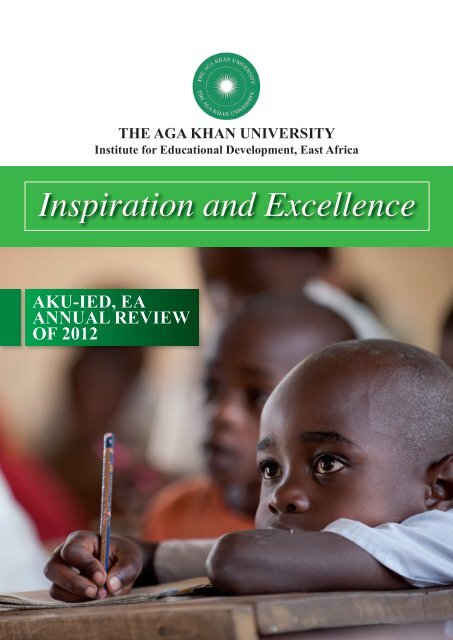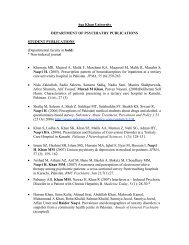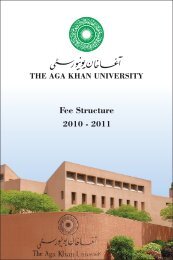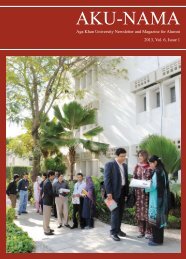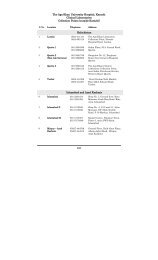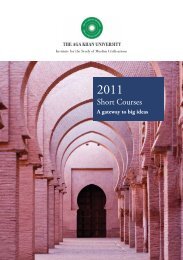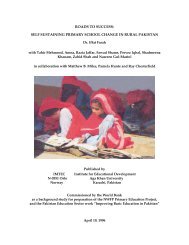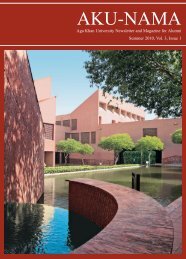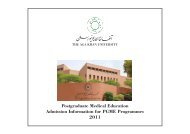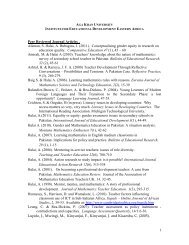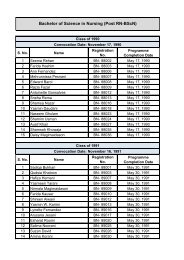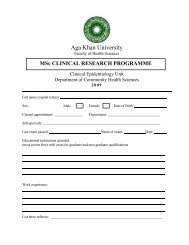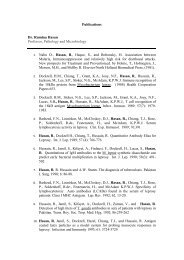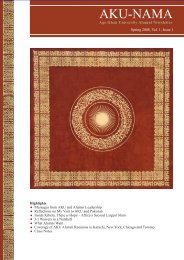Inspiration and Excellence - Aga Khan University
Inspiration and Excellence - Aga Khan University
Inspiration and Excellence - Aga Khan University
Create successful ePaper yourself
Turn your PDF publications into a flip-book with our unique Google optimized e-Paper software.
Our MastersProgrammeThe Master of Education (MEd) is a two-year full-timepostgraduate degree, open to graduate teachers, teachertrainers, school leaders <strong>and</strong> other education professionals. Itaims to build capacity for effective teaching <strong>and</strong> leadershipin support of raising the quality of education. We are pleasedthat a range of sponsors work with us in facilitating studentscoming onto the programme. For our intake of 37 studentsin November 2012, 5 students received scholarships fromAWALI-Reads, 8 were funded through the StrengtheningEducation Systems East Africa CIDA-fundedproject, 2 by the Ug<strong>and</strong>an Government, 1 by the <strong>Aga</strong> <strong>Khan</strong>Foundation, 1 was self-sponsored, with the remaining 20 fullysponsored directly by the <strong>Aga</strong> <strong>Khan</strong> <strong>University</strong> itself.Those admitted into the Masters programme specialize ineither Teacher Education or Educational Leadership <strong>and</strong>Management. All students engage in a range of core coursesincluding assessment, teaching, learning <strong>and</strong> curriculum,research methods <strong>and</strong> school improvement. Those on theTeacher Education specialization choose two courses ofEnglish, social studies, science <strong>and</strong> mathematics, whilst those onthe Educational Leadership <strong>and</strong> Management specializationengage in courses including effective leadership, schoolas a learning community, <strong>and</strong> monitoring <strong>and</strong> evaluation.Elective courses are offered, giving students the opportunity to13
Our Masters programme hasquickly gained a reputation fordeveloping high calibreteachers <strong>and</strong> leaders who areadept at proactively respondingto issues that affect the qualityof education in schoolsengage with ICT, gender or logic as they relate to education in somedepth. All students also undertake a substantial piece of their own researchwritten up as a dissertation, enabling them to put into practice the researchskills developed over the programme <strong>and</strong> to investigate one particular area indepth.The programme at IED importantly has a Practicum component,led by Wachira Nicholas. This requires students to spend twoweeks in each semester in schools in <strong>and</strong> around Dar es Salaamteaching, conducting small-scale inquiries, as well as conductingworkshops. The Practicum is integrated into the course participants’(CPs) course work <strong>and</strong> provides an opportunity for CPs to apply <strong>and</strong>extend the knowledge, skills <strong>and</strong> attitudes learned in their course workto produce increasingly advanced levels of underst<strong>and</strong>ing <strong>and</strong> skill.The Practicum essentially promotes the integration of academicknowledge with practical experience, <strong>and</strong> provides CPs with anopportunity for field <strong>and</strong> real life educational context experience for theirteaching, leadership <strong>and</strong> research work.The practicum experience is made possible by partnershipsbetween AKU IED, EA <strong>and</strong> the Regional Education Office of Dares Salaam, the Municipalities of Kinondoni, Temeke <strong>and</strong> Ilala, <strong>and</strong>45 schools <strong>and</strong> a teachers training college where the CPs go for theirPracticum. These schools provide an interesting mix of public <strong>and</strong> privateprimary <strong>and</strong> secondary schools. Every semester each CP spends anequivalent of 12% of their semester course work in these institutions as part oftheir practicum activities.Across East Africa – in Tanzania, Kenya <strong>and</strong> Ug<strong>and</strong>a - someof our alumni are now serving in senior leadership positions. Forexample, Bakari Issa has recently been promoted to Director, TeacherEducation, Teacher Education Department, in the Ministry ofEducation <strong>and</strong> Vocational Training, Tanzania, while Laban Onono wasrecently promoted from a Senior High School Principal toa County Director of Education in Kenya. Others have beenpromoted to head county or district initiatives (e.g. Enos Kiforo, Kenya;Euphrasia Buchuma, now Regional Educational Officer, Mwanza,Tanzania). Others have been appointed to positions of responsibilitywithin schools <strong>and</strong> teacher colleges (e.g. Dorothy Mhaiki, Head of aTeacher Training College, Tanzania, <strong>and</strong> Rose Akullo, an experienced tutorat Kotido Primary Teachers College in Ug<strong>and</strong>a. Our graduates are alsoworking in the university sector (e.g. Laura Shayo, Mt. Meru <strong>University</strong>,Tanzania).A review of our Masters programme is currently underway. Thiswill result in a one-year Masters programme, a wider range ofspecialisms as well as electives. The programme will also beoffered on a part-time basis in each of the three East African countries.Further details of the programme can be found atDr Geoff TennantAssociate Professor <strong>and</strong> Head of ProgrammesOUR MASTERS PROGRAMMEhttp://www.aku.edu/collegesschools<strong>and</strong>institutes/ied/eastafrica/AcadProg/Pages/MEd.aspx.4
RESEARCH AT AKU-IEDThe aim of our research is to contribute to the transformation of policy <strong>and</strong>practice of education in East Africa. Our research is concentrated in twomultidisciplinary Research Networks.OUR RESEARCH NETWORKSMulti-Literacies in Multilingual Education (MIME)Schools <strong>and</strong> classrooms globally are increasingly multilingual in nature sothat monolingual classrooms are not necessarily a norm. While reasonsfor multilingualism vary in East Africa, this is not simply because of thewide range of local/regional African language backgrounds of the teachers<strong>and</strong> the learners. It is also because the policies pertaining to the languageof instruction in the region m<strong>and</strong>ate that teaching <strong>and</strong> learning processesbe in the second or the third language of the learners. The MIME networkis the intellectual home for research focused on improving basic educationespecially the development of multiple literacies in multilingualcontexts. Here, literacy is not limited to the traditional notion of reading <strong>and</strong>writing of print materials. It is a holistic <strong>and</strong> complex notion of literaciesthat embrace scientific, mathematical <strong>and</strong> ICT literacies as well as language<strong>and</strong> literacy.7
Inclusion <strong>and</strong> Equity in Education (InEEd)Improving access to quality education raises issues of inclusion <strong>and</strong> equity, so that all learnerscan access quality education irrespective of gender, HIV AIDS or other forms of exclusion. Thisnetwork focuses on issues of equity <strong>and</strong> inclusion within the multilingual contexts of education <strong>and</strong>more broadly. Research within East Africa in InEEd is investigating:4 approaches to teaching controversial <strong>and</strong> sensitive issues4 concerns of social justice in, for example, the language of instruction <strong>and</strong> effective learning4 gender – boys <strong>and</strong> girls - issues in classrooms4 school governance <strong>and</strong> leadership4 students’ experience of seeking teachers’ help in classrooms4 contextually relevant approaches to early childhood care <strong>and</strong> education, <strong>and</strong>4 provision for gifted <strong>and</strong> talented students in mathematics.RESEARCH NETWORKS AKU-IED, EAWithin each Research Network there are thematic Research Interest Groups (RIGs):RESEARCH AT AKU-IEDMulti-Literaciesin MultilingualEducationInclusion &Equity inEducationEarly YearsEducation &DevelopmentRIGICT Research&DevelopmentRIGEducationalLeadership,Gender &WideningParticipationRIGMathematics &Science RIGResearch Interest GroupsSpecial Interest Group in Mathematics <strong>and</strong> Science Education (SIGMAS) - SIGMAS is a vibrant <strong>and</strong>dynamic group of professionals <strong>and</strong> academics, keenly interested in improving the quality of Science <strong>and</strong>Mathematics teaching in East Africa. Research mainly looks at issues of multilingualism <strong>and</strong> equity inScience <strong>and</strong> Mathematics education.ICT Research <strong>and</strong> Development - This group looks creatively at blended learning <strong>and</strong> othercontextually relevant approaches to integration of ICT in Education with the potential of increasing access toquality education, thereby reducing the deep inequities <strong>and</strong> inequalities often seen, in particular in rural <strong>and</strong>urban classrooms in East Africa.Early Years’ Education <strong>and</strong> Development - The Early Years’ Education Research Interest Group looks atseveral issues for young learners in the community, as they transition into the formal education system <strong>and</strong>in schools. Research within this theme is around issues of home-school transition <strong>and</strong> knowledge-exchange,stakeholders’ perceptions <strong>and</strong> practices of literacy, classroom-based assessment of learning <strong>and</strong> literacydevelopment, <strong>and</strong> contextually relevant approaches to early childhood education <strong>and</strong> care.Educational Leadership, Gender, <strong>and</strong> Widening Participation - Leadership in education is a contestednotion as it is typically seen as residing in designated roles <strong>and</strong> positions. However, at IED-EA broader,contextually situated <strong>and</strong> distributed notions of leadership <strong>and</strong> their role in transforming schools <strong>and</strong>other educational institutions are the focus of our investigations. Issues of equity <strong>and</strong> inclusion embedded inleadership are a special focus of this research group.8
PUBLICATIONS 2012Peer Reviewed Journal ArticlesDachyshyn, D. M. (2012). Children dwelling in the absence of home.Indo-Pacific Journal of Phenomenology, Special Edition. 12.Kajoro, P. (2012). Conventionalization of numerals in Tanzania; Considers relationalunderst<strong>and</strong>ing <strong>and</strong> arithmetic operations. Mathematics Teaching, 227, 15-22.Halai, A., & Karuku, S. (2013). Implementing language-in-education policies in multilingualmathematics classrooms: Pedagogical implications. Eurasia Journal of Mathematics, Science <strong>and</strong>Technology Education, 9(1), 167-176.Ngwaru, M. (2012). Parental involvement in early childhood care <strong>and</strong> education: Promoting children’ssustainable access to early schooling through social-emotional <strong>and</strong> literacy development.Southern African Review of Education, 18(2), 25-40.Onguko, B. B., Abdalla, M. & Webber, C. (2012). Walking in unfamiliar territory: Head teachers’preparation <strong>and</strong> experiences in their first year in Tanzania. Educational Administration Quarterly,48, 86 -115.Book Chapters (Refereed)Colvin, G., Dachyshyn, D. M., & Togiaso, J. (2012). Speaking from the margins to the centrein early childhood initial teacher education. In D, Gordon-Burns, A. Gunn, K.Purdue, & N. Surtees (Eds.), Te Aoturoa Tataki. Inclusive early childhood education:Perspectives on inclusion, social justice <strong>and</strong> equity from Aotearoa New Zeal<strong>and</strong>.Wellington, New Zeal<strong>and</strong>: NZCER Press.Halai A. (2012). Teachers as participants in classroom reform: Promise <strong>and</strong> perils of actionresearch. In S. Rizvi (Ed.), Multidisciplinary Approaches to Educational Research(pp.141-156). London: Routledge.Published in Refereed Conferences ProceedingsHalai, A., & Barwell, R. (2012). Topic Study Group 30: Mathematics Education in aMultilingual <strong>and</strong> Multicultural Environment. Official Proceedings of the12thinternational Congress on Mathematics Education ICME -12, Vol. 1, Seoul, KoreaHalai, A., & Karuku, S. (2012). Learning mathematics in multilingual classrooms: policies <strong>and</strong>practice. Pre-proceedings of the12th International Congress on Mathematicseducation ICME -12, Seoul, Korea. Available at http://www.icme12.org/sub/sub02_05.aspKajoro, P., & Halai, A. (2012). Transition from Kiswahili to English: experiences fromtanzanian mathematics classrooms. Pre-proceedings of the 12th Internationalcongress on Mathematics Education ICME 12, Seoul, Korea. Available at http://www.icme12.org/sub/sub02_05.aspNgwaru, J. M., & Ngwaru, C. (2012). Education system in Zimbabwe, 1890 – 2008: Victim ofoppressive politics of inequality. In Wolhuter, C. C., (Ed.) (2012). Redrawing theboundaries of difference in the region: Regionalization as a new space for educationalchange. Potchefstroom: Platinum Press.Onguko, B. (2012). Context <strong>and</strong> appropriate technology: The unavoidable partnership. Theinternational Conference on e-Learning. Hong Kong, China.Onguko, B & Crichton, S. (2012). Making significant change through appropriate technology inrural Kenya: A case study. Annual Meeting of the American Educational Researchassociation. Vancouver, British Columbia, Canada.Onguko, B., Jepchumba, L. & Gaceri, P. (2012). Reflections on design <strong>and</strong> implementation ofblended learning for teachers’ professional development. International conferenceon Educational Reform <strong>and</strong> Innovation in Enhancing Quality <strong>and</strong> Equity. Kenyattauniversity, Nairobi, Kenya.9
Selected Research ProjectsPartnership Development to ResearchPossibilities for Primary MathematicsTeacher Development in Rural <strong>and</strong>Remote Communities(SSHRC Canada Award 890-210-0027)Building on her extensive experience of research <strong>and</strong>development in mathematics education in developingcountries, Professor Anjum Halai is providing leadershipfrom AKU on this research project set in rural <strong>and</strong> remoteeducation institutions in Tanzania. Emerging findingsfrom this work in progress provide deep <strong>and</strong> significantinsights into how universities as partners can work withlocal communities, regional <strong>and</strong> national institutions,<strong>and</strong> international organizations to enhance mathematics teacher education in rural <strong>and</strong> remote settings.Lessons learned from this partnership will contribute to a global underst<strong>and</strong>ing of the key role of partnershipswith communities to address complex social issues such as the performance of primary school children inmathematics.What Has Language to do with School Underachievement?Student Performance in National Examinations – The Dynamics of Language(ESRC/DFID Major Research Grant, RES-167-25-0263)The laments <strong>and</strong> outcries are frequent. Educational st<strong>and</strong>ards are falling! Schools are failing students<strong>and</strong> also failing to improve levels of achievement required to develop cadres of professionals <strong>and</strong>individuals able to participate in productive economic activity as the basis for economicdevelopment in low income countries. When examination results are released from examinationboards, questions are raised as to why there are so many failures. In a similar vein, internationalor regional surveys, such as the UWEZO or SAQMEQ studies, also lead to a rush of newspapereditorials, letters <strong>and</strong> articles with contributors positing the reasons behind such failure <strong>and</strong> poorschool <strong>and</strong> student performance. Teachers <strong>and</strong> the lack of resources are frequently cited as keyreasons. Very few commentators would point to ‘language’ being a significant factor in schoolunderachievement. Why, then, do so many children underachieve <strong>and</strong> what effect, if any, doesEnglish have on children’s achievement in school?The research of Professor Pauline Rea-Dickins – Director, AKU-IED - <strong>and</strong> colleagues fromthe State <strong>University</strong> of Zanzibar <strong>and</strong> the <strong>University</strong> of Bristol highlights how English languageproficiency may be a major barrier to examination success. In a context where Kiswahili is thechildren’s home language <strong>and</strong> English the language of school, this research shows three main factorscontributing to examination underachievement. First, the quality of the national examination results aredetermined by the school children attend; secondly, by the level of the children’s English languageproficiency, with the majority of children having exceedingly limited knowledge of basic English wordsessential for learning <strong>and</strong> being tested through English. Thirdly, there is the quality of examinationdevelopment processes <strong>and</strong> the examination papers themselves. Overall, this study found that itis the school children attend <strong>and</strong> their comm<strong>and</strong> of English that makes a huge difference to theirexamination results. In other words, children’s underachievement is strongly related to schoolfactors (e.g. teacher qualifications, availability of teachers) <strong>and</strong> how well they know English. Formore information, see www.bristol.ac.uk/spine;http://www.esrc.ac.uk/funding<strong>and</strong>guidance/fundingopportunities/internationalfunding/esrc-dfid/growth.aspx.10
East Africa Quality Learning (Evaluation Study, AKF)This project evaluated the implementation of the Reading to Learn methodology, earlierdeveloped <strong>and</strong> used in Australia with significant results, <strong>and</strong> rolled out in disadvantagedcommunities in Kenya <strong>and</strong> Ug<strong>and</strong>a. The evaluation was led by Dr Marriote Ngwaru,an expert in the field of literacy development <strong>and</strong> on issues of home school transition inthe early years. It provides valuable lessons with regards to head teacher effectiveness,children’s reading ability, teacher pedagogy <strong>and</strong> the utilization of learning materials <strong>and</strong>community libraries.The results show that head teachers were central to the success of theReading to Learn innovation. Where heads were committed proactive managers <strong>and</strong>leaders, distinct success stories <strong>and</strong> evidence of improving learning outcomes wereobserved. Also children’s reading abilities were seen to be improving as aresult of this approach which was giving children more exposure to readingmaterials <strong>and</strong> reading practice during lessons but this needed to be taken further byteacher proactivity. Teachers managed to control large classes by following specificliteracy <strong>and</strong> numeracy teaching strategies effectively to enable most of the learners tofollow with underst<strong>and</strong>ing.This evaluation highlighted that effective use of available materials was moreimportant than just the availability of materials, as in many cases classroomlibraries were not put to maximum use. Community libraries were an importantinnovation that was bringing in new reading attitudes towards reading <strong>and</strong> books amongboth parents <strong>and</strong> children but as in all educational innovations, it requires more time toyield sustainable results.A Baseline Study for Investigating Literacy Perspectives <strong>and</strong> Practices inEarly Years in a Tanzania Rural Public Primary School (funded by the URC).Sponsor: AKU <strong>University</strong> Research CouncilGrant ID 111002EA PI: Dr. Lilian VikiruThis was a baseline case study study carried out by Dr Lilian Vikiru - alanguage <strong>and</strong> literacy specialist - in rural Tanzania to investigate the perspectives, <strong>and</strong>practices of literacy among teachers <strong>and</strong> pupils in Mvomero district in ruralTanzania. The study employed a qualitative case study design, to facilitate thecollection of rich <strong>and</strong> in-depth information through document analysis,face-to-face interviews, lesson observation <strong>and</strong> focus group discussions. Thestudy revealed that various stakeholders had different but related perceptions ofliteracy. They expected literacy to encompass more than reading <strong>and</strong>writing <strong>and</strong> to include skills that support individuals to acquire knowledge, skills <strong>and</strong>attitudes to support social <strong>and</strong> economic advancement. The most common literacypractices among teachers <strong>and</strong> pupils were the reading of newspapers, holding informaldiscussions <strong>and</strong> listening to the radio. This study established that there wasminimal parental involvement in the nurturing of pre-literacy <strong>and</strong> literacy skills amongpre-school children. Schools lacked resources <strong>and</strong> most teachers neededprofessional development programs for both content knowledge in English <strong>and</strong>pedagogical content knowledge to make their classes more interactive. Therewas inadequate parental involvement in education <strong>and</strong> school affairs. This studyprovided IED with insights on the type <strong>and</strong> nature of educational interventions to bedeveloped for the district <strong>and</strong> data <strong>and</strong> materials for our current professional developmentcourses in literacy.111
Student Intake Study Faculty of Health Science <strong>and</strong>Faculty of Arts <strong>and</strong> Sciences(Sponsored by AKU Provost Office)A study was conducted by IED-EA as part of a set of projects intended to inform thedesign of a Student Intake Strategy for the proposed Faculty of Health Sciences <strong>and</strong>Faculty of Arts <strong>and</strong> Sciences of the <strong>Aga</strong> <strong>Khan</strong> <strong>University</strong>. The project had two aims:a) to compare official <strong>and</strong> implemented curricula for the main programmes preparingstudents for entry to Higher Education delivered in East Africa in the subject areas ofEnglish, Mathematics <strong>and</strong> Biology; <strong>and</strong> b) to make recommendations for the design of astudent intake study that targets academically talented Tanzanian students, including thosebelonging to educationally marginalised groups. On the basis of findings, the study madeseveral recommendations about identifying talented students, the selection of students, <strong>and</strong>meeting the needs of the student intake.Upcoming research <strong>and</strong> developmentprojectsSeveral new exciting <strong>and</strong> highly contextual projects have been approved for 2013-14. These include the following:Early Literacy development for sustainable schooling in Southern TanzaniaSponsor: Strengthening Education Systems East Africa (SESEA)PI: Dr. Marriote NgwaruThis research project – based in the Southern Region <strong>and</strong> District of Lindi Rural inTanzania - aims to identify barriers to literacy development in the early years, as thebasis for supporting <strong>and</strong> strengthening the promotion of knowledge exchange byparent-teacher collaboration through a study of home literacy practices <strong>and</strong> classroomliteracy development. It will develop appropriate early years’ literacy learning materials.Starting with a baseline survey of all schools in the district, this study includes atraining <strong>and</strong> development component for the development of locally relevant materialdevelopment to promote early development of literacy.Partnership with <strong>University</strong> of Victoria <strong>and</strong> Mapping ECD provision inTanzaniaSponsor: Project for the Advancement of Human Development in Africa <strong>and</strong> Asia.PI: Prof. Pauline Rea-Dickins (AKU-IED), Co-PI: Prof. Alan Pence, <strong>University</strong> ofVictoria, Canada, with Shelina Walli (AKU-IED)The main goals of this project are to strengthen the evidence base of national capacity<strong>and</strong> approaches to interventions for the delivery of effective Integrated Early ChildhoodDevelopment interventions in Tanzania, through the identification <strong>and</strong> promotion ofeffective practices appropriate to the region, gaps in provision, <strong>and</strong> the potential forreplication of good practices across Tanzania.12
Mapping the Early Childhood Care <strong>and</strong> Education (ECCE) L<strong>and</strong>scape inCoastal Kenya <strong>and</strong> West Nile Ug<strong>and</strong>aSponsor: Strengthening Education Systems East Africa (SESEA)PI: Dr. Darcey Dachyshyn (AKU-IED)Aligning with the Tanzanian study above, the overarching goal of thisproject is to build a comprehensive map of the early childhood care <strong>and</strong> educationl<strong>and</strong>scape in Coastal Kenya <strong>and</strong> West Nile Ug<strong>and</strong>a. This will provide the basis forIED-EA <strong>and</strong> its AKDN <strong>and</strong> other partners to contribute to the capacity developmentof carers, teachers, school boards, agencies, day care <strong>and</strong> pre-school centres, <strong>and</strong>government expertise to deliver services <strong>and</strong> programs that strengthen educationsystems in contextually relevant ways.International Commission of Mathematics Instruction (ICMI) – FourthCapacity <strong>and</strong> Network Project 2014 in TanzaniaSponsor: ICMI & UNESCOPI: Prof Anjum Halai (AKU-IED) <strong>and</strong> Prof Ferdin<strong>and</strong>o Arzarello, ICMI PresidentThe Capacity <strong>and</strong> Network Project 4 aims to build expertise in mathematicseducation <strong>and</strong> create a sustainable regional network with a common goal ofimproving mathematics education. It is anticipated that more than 50 participantsfrom Tanzania, Kenya, Ug<strong>and</strong>a <strong>and</strong> Rw<strong>and</strong>a will attend the two-weekprogram to be held at the AKU-IED, Dar es Salaam. Participants will mainly comprisemathematics teachers, teacher educators <strong>and</strong> curriculum developers. Participants willalso include members of the international mathematics education community. Theprogramme will include a variety of highly relevant activities including publiclecture(s) demonstrating mathematical modeling based on real life issues ofsignificance to East Africa, keynote papers on significant aspects of mathematicseducation in the region, teacher development workshops on mathematicstopics drawn from the regional high school curricula, media engagement sessions, <strong>and</strong>opportunities for the wider community to participate in mathematical activities.Strengthening Secondary Education in Practice: Language SupportiveTeaching <strong>and</strong> Textbooks in TanzaniaSponsor: AnonymousLead Researcher AKU-IED: Peter Kajoro – a research project awarded to the <strong>University</strong> ofBristol UK in collaboration with AKU-IED, the <strong>University</strong> of Dodoma <strong>and</strong> the Tanzania Institutefor Education.This study will support transition from primary to secondary for the largemajority of learners in Tanzania who are not fluent in English. The overarching goalis to make textbooks <strong>and</strong> teaching accessible to second language learners throughpiloting innovations in disadvantaged rural schools <strong>and</strong> establishing expertise inkey government institutions. The project will support the development of textbooksfor students in the first year of secondary, <strong>and</strong> in the process establish sustainableexpertise within the Tanzania Institute of Education, the government agencyresponsible for ensuring quality of school learning materials. How textbooksimpact on learning depends on how they are used. The project will also integratelanguage supportive pedagogy that makes use of the textbooks into existing teachereducation programs, working in collaboration with Morogoro Teachers College,one of Tanzania’s largest colleges for training secondary school teachers. Keylearning contributions relate to: how to design textbooks for second languagelearners, how accessible textbooks support interactive classroom learning <strong>and</strong>language acquisition, <strong>and</strong> processes of implementation that emphasize formativeevaluation <strong>and</strong> systemic capacity building.113
Introducing Algebra: A Scoping StudySponsor: AKU-IED EAPI: Dr. Geoffrey TennantAlgebra lies at the very heart of mathematics, giving rise to extremelypowerful tools facilitating generalizability <strong>and</strong> compact forms of communication. It is,perhaps, algebra’s very power <strong>and</strong> compactness which means that it can bedifficult to learn. The proposed research is a baseline study, aiming to establish currentpractices in introducing algebra in, initially, a small sample of Tanzanian schools. It isexpected that this research will lay the foundations for future research, including actionresearch projects undertaken by serving teachers on masters programmes, <strong>and</strong>intervention projects working with teachers <strong>and</strong> pupils looking to explore waysof bringing algebra to life in the classroom leading to deep learning of concepts,keeping it close to number <strong>and</strong> looking to ensure strong connectivity of thinking.AKU-IED, EA ANNUAL RESEARCH INSTITUTEAnnual Research Institute 2012The Annual Research Institute 2012 was held from 14November to 16 November 2012. The theme for this year wasInclusion <strong>and</strong> Equity in Education: Focus on GenderCurrent issues for Research <strong>and</strong> Practice. We had a total of83 participants.The Keynote Speakers were:Dr. Fatuma Chege: Associate Professor & Dean, School ofEducation, Kenyatta <strong>University</strong>, Nairobi Kenya.Professor Miriam David: Professor Emerita of Education,Institute of Education, <strong>University</strong> of London & VisitingProfessor, Centre for Higher Education & Equity Research(CHEER), <strong>University</strong> of Sussex.Dr Jolly Rubagiza: Acting Director, Centre for Gender,Culture & Development, Kigali Institute of Education,Rw<strong>and</strong>a.Dr. Anna Obura: International Consultant Specialist,Equity in Education.Dr. Fatuma Chege14
Annual Research Institute 2013ARI 2013 will focus on the topic, ‘Towards ContextuallyRelevant Early Years Care <strong>and</strong> Education’. Takingplace in October 2013, this ARI will explore the notion thatchildren <strong>and</strong> childhood are not static nor clearly definedconcepts or lived realities <strong>and</strong> how in our globalized worldthe evolution of children <strong>and</strong> childhood is increasinglydifficult to trace.The Research Institute will provide opportunities for:4 Development of collaborative research networks atlocal, regional & international levels4 Sharing of knowledge, experience & expertise in keyareas of social science research especially withreference to early years care <strong>and</strong> educationProfessor Anjum HalaiHead ResearchProfessor Anjum HalaiHead ResearchLearners, teachers, schools <strong>and</strong> the community are changing in the increasingly global <strong>and</strong>technological world. Old paradigms framing education are being challenged <strong>and</strong> raising newquestions. Research has a key role to play in addressing the new questions that emerge. OurResearch Networks <strong>and</strong> the embedded Research Interest Groups ensure that contextuallyappropriate <strong>and</strong> significant questions are addressed as IED-EA aspires to be a ‘Research Led’institution of higher learning in the region.Partners IN EDUCATIONAt IED we have a number of local <strong>and</strong> internationalinstitutional partnerships as well as close working ties <strong>and</strong>Memor<strong>and</strong>um of Underst<strong>and</strong>ing (MoU) with governmentsin the region.Internationally, we work with the <strong>University</strong> of BritishColumbia, Canada with Dr Susan Crichton (formerly the<strong>University</strong> of Calgary) as Visiting Faculty. Susan has beena regular visitor to IED since 2008, providing supportin the area of ICT. Her last visit was in December 2012supporting our use of new technologies in teaching,learning <strong>and</strong> research. Susan comes to us with a wealthof experience in this area <strong>and</strong> she was also the doctoralsupervisor of Dr Brown Onguko, now an AssistantProfessor at IED, who successfully completed hisdoctorate in 2012 from the <strong>University</strong> of Calgary.Brown investigated the use of solar power tablets in thedelivery of Teacher Education programmes in rural Kenya(www.jifunzeni.com).115
INTERNSHIPSInternshipsIED welcomes Interns from its partner universities <strong>and</strong> in partnership with the Facultyof Education, <strong>University</strong> of Alberta, it also won the Student for Development Awardfunded by the Association of Universities <strong>and</strong> Colleges Canada (http://www.aucc.ca/programs-services/international-programs/students-for-development/)This Award enabled Sasha Wittes to join IED in 2012 as an Exchange Student. Sashawas doing her Masters at the <strong>University</strong> of Alberta <strong>and</strong> was with us for three months.Veronica Sarungi <strong>and</strong> Sospeter Kamunyila, both from Tanzania, were MEd studentswho have been studying at IED since 2010. Both took up an internship at the <strong>University</strong>of Alberta for a period of one term from September to December 2012. Veronica’s MEddissertation explored the use of ICT in the teaching <strong>and</strong> learning of Mathematics. She isalso interested in learning disabilities. Sospeter also works in Mathematics Education.From Intern to Faculty memberAKU has a long st<strong>and</strong>ing relationship with the<strong>University</strong> of Alberta, <strong>and</strong> in 2011, funded bythe International Internship Programme of AKU,IED welcomed Simon Karuku for a 9 monthinternship. Simon was a doctoral student inthe Department of Secondary Education at the<strong>University</strong> of Alberta in Canada but after hisinternship applied for a faculty position.Following successful interview, Simon joinedIED as a Lecturer in Mathematics Education.His research interests focus on teacher-student<strong>and</strong> student-student relationships in Mathematicsteaching <strong>and</strong> learning <strong>and</strong> his doctoral workexplored students’ experiences when seeking <strong>and</strong>giving help in Mathematics classrooms.16
POLICY DIALOGUESPOLICY DIALOGUESFaculty have been involved in a number of policy dialogues. For example,Professor Pauline Rea-Dickins (Director IED) <strong>and</strong> Dr Guoxing Yu (<strong>University</strong>of Bristol, UK) presented the final report of the ESRC/DfID Research Study onStudent Performance in National Examinations: the dynamics of language to theMinistry of Education <strong>and</strong> Vocational Training, Zanzibar, February 2012. Paulinewas then invited to give a presentation of the findings to the Donor Partner GroupMeeting in Zanzibar, also in February 2012. See also:http://www.esrc.ac.uk/funding<strong>and</strong>guidance/fundingopportunities/internationalfunding/esrc-dfid/growth.aspxShelina Walli, one of our specialists in Early Childhood Education hasrepresented IED at a number of meetings in Tanzania, including the ECD Forumthat took place in Arusha 21- 24 Feb 2012. AKU has been involved in discussionsthat have been key to the primary objective of the forum, which was to bringthe ECE agenda on the table for the Ministries in the country. A declaration wassigned by the government to take this agenda forward. The IED has strengths inIntegrated ECE <strong>and</strong> is positioned to be a key partner in developing a strategic planfor the implementation of the country’s ECE policy.AWALIThe Awali is a Calgary-based philanthropicgroup that supports professionaldevelopment programmes for teachers in EastAfrica <strong>and</strong> donated very generously to theInstitute for Educational Development in EastAfrica in its initial five years. A delegationincluding some of the founding members ofthe group, namely Jim Gray, Brian Felesky<strong>and</strong> Sherali Saju came to visit AKUIED,EA in October 2012. The Awali group hasalso supported a partnership between AKU-IED, EA <strong>and</strong> Room to Read (RtR), whichis an organization that works in developingcountries focusing on literacy <strong>and</strong> genderequality in education.17
IED IN THE MEDIAFeaturingEARLY CHILDHOOD EDUCATION ANDDEVELOPMENTOur objectives of working towards buildingcapacity, especially in collaborating with keyproviders of education in the Early ChildhoodEducation <strong>and</strong> Development context <strong>and</strong> advocatingearly intervention in the lives of a child, aredirectly aligned to current priority goals of the regionalgovernments <strong>and</strong> a number of NGOs.THE CITIZEN Tuesday 24 April 2012Integrated Early Childhood Education is a central focus within ourResearch Networks. It is offered as an elective on our Masters programme<strong>and</strong> we are introducing Early Childhood Education as a new course onour MEd from 2013. Currently, we also offer a Certificate in Educationin ECED <strong>and</strong> provide short courses, <strong>and</strong> workshops in this area crucial tohuman development <strong>and</strong> well-being.18
RECENTLY PUBLISHED BOOKScommunity-based sexual knowledge <strong>and</strong> asks howthese knowledge interact with AIDS educationprogrammes in school. Old enough to knowshowcases the possibilities of consulting pupils usingengaging, interactive <strong>and</strong> visual methodsincluding digital still photography, mini-videodocumentaries, as well as interviews <strong>and</strong>observations. These innovative methods allowchildren to speak freely <strong>and</strong> openly in contextswhere talking about sex to adults is a cultural taboo.The study also sheds fresh light on teachers’ fears<strong>and</strong> struggles with a lack of training <strong>and</strong> limitedopportunities for reflection on practice. It engagesin dialogue with conflicting voices of communitystakeholders who are both aware of the dangers facedby children living in a world with AIDS <strong>and</strong> who arealso afraid of the many cultural, religious, <strong>and</strong> moralrestraints to sex education in Africa.Addressing Issuesof Access <strong>and</strong>Fairness inEducationThrough Dynamic AssessmentEdited by Matthew E Poehner <strong>and</strong> PaulineRea-Dickins, London: RoutledgeIncreased emphasis in many school systems onformal testing to mark student achievement has begunto heighten concern among many educational policymakers, assessment specialists, <strong>and</strong> classroomteachers over questions of access <strong>and</strong> fairness, particularlyfor learners from culturally different backgrounds<strong>and</strong> those with a history of academic struggles. Thissituation echoes that faced by the Russian psychologistL. S. Vygotsky nearly ninety years ago in his efforts tounderst<strong>and</strong> processes of development <strong>and</strong> meet theneeds of all learners. His famous proposal of the Zone ofProximal Development (ZPD) holds that assessmentsmust take account not only of abilities that havefully formed but also those that are still emerging. Thediagnostic value of the ZPD lies in identifying theunderlying source of learner difficulties as well as theirfuture potential. Since Vygotsky’s time, psychologists<strong>and</strong> educators have devised a range of practices forengaging with learners in ZPD activity that havecome to be known as Dynamic Assessment (DA).In DA, assessors go beyond observations ofindependent performance <strong>and</strong> engagecooperatively with learners to both underst<strong>and</strong> <strong>and</strong>support their development.This process is in full evidence in the papers inthis collection, which offers a cross section ofapplications of DA with diverse populations,including special needs learners, immigrant <strong>and</strong>minority students, <strong>and</strong> second language learners.While these papers may be read as cutting-edgeacademic research, they also represent acommitment to going beyond manifest difficulties<strong>and</strong> failures to help individuals construct a morepositive future.20
HEADED IN THE RIGHT DIRECTIONAKU-IED, EA is exp<strong>and</strong>ing its activities within East Africa, <strong>and</strong> conductingtargeted <strong>and</strong> relevant research <strong>and</strong> providing specialist programmes uniquely suitedto the region’s needs. We are increasing the numbers on our Masters <strong>and</strong> CELLprogrammes, making plans to develop more courses to meet the needs of the region <strong>and</strong>also conducting a feasibility study to deliver a doctoral programme in the near future.As part of the strategy for growth we are making a number of senior appointments,which will be a key addition to our existing expertise <strong>and</strong> will also increase the number ofresearch active faculty. These elements, combined with enriching ongoing partnershipsthat the Institute has with a number of international universities, has positioned the IED asan institution which is prepared to meet the current <strong>and</strong> future requirements of educationalprofessionals, leaders <strong>and</strong> managers across East Africa.The <strong>Aga</strong> <strong>Khan</strong> <strong>University</strong>Institute for Educational Development, East Africa,P.O Box 125, Dar es Salaam, TanzaniaTel: +255 22 215 0051, Fax: +255 22 215 0875, Email: iedea@aku.edu, Web: www.aku.edu/iedea


